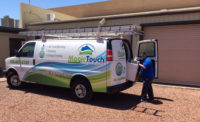Last year, before the pandemic, the biggest challenge facing Texas HVAC contractors was a mild winter that cut into business. This year, those same HVAC contractors found themselves dealing with a deep freeze that left millions of people without power to heat their homes. Parts of the state set records for days below freezing.
Kelvin and Angi Rogers own Aire Serv of Fort Worth and Aire Serv of Weatherford, two HVAC franchises from Neighborly. Like most parts of the state, their service area experienced freezing temperatures and snow accumulation in mid-February. This led to several days without power and, as a result, several days without heat when customers needed it most. And there was little the Rogers could do about it.
“Although customers were desperate for warmth, several factors made the scenario different than anything we’ve faced before,” they said. “Many of our customers had no power, so the solution to getting their homes heated was getting them generators and fuel. All in all, our customers were very reasonable and understanding during a dangerous, scary time.”
Angi Rogers said the technicians at Aire Serv bundled up and braved the snow and ice. They served as many customers as they could and even picked up a few new ones. Office staff stayed home but continued answering phones to route the technicians through the road situations to the customers’ homes. She said the call volume was definitely higher than it was a year ago.
The company’s service went beyond HVAC. It included bringing water to customers and helping to hook up their generators.
Heat Pumps Face Freeze
One of the most common calls to Aire Serv concerned heat pumps. Many of the Rogers’ customers use these units, which are popular in Texas. Homeowners weren’t sure how to keep them operating or how to protect them from damage.
Eddie Glidewell, owner of Comfort Crew Cooling and Heating in San Marcos, Texas, posted a blog on his firm’s website to explain heat pump issues to his customers. Glidewell said heat pumps actually freeze up regularly in the summer, when the state’s extreme heat keeps them running at full strength for long periods of time. The same thing happened during the winter storm.
“If it’s cold in Texas, below freezing for more than two days, this whole state shuts down,” Glidewell said. “They don’t know what to do.”
Glidewell said many people worried about steam coming off their heat pumps during the winter storm. Many thought their units were catching on fire. He explained that is a normal occurrence as the heat pumps enter defrost mode.
Energy Strategy Designed For Air Conditioning, Not Heat
While debate continues over why Texas experienced such a massive power failure, Glidewell has some personal insight. Before starting his HVAC firm, he spent some time working for Austin Energy. If someone wants to understand what happened in Texas this winter, he said, they need to look at the state’s summers.
A severe cold snap has struck Texas three time in the past few years, but winters in Texas are usually not this bad. Summers, however, are often brutally hot, with temperatures topping 90 degrees for months. Glidewell said the power companies need to ensure they can meet the state’s demand for air conditioning during this time.
It’s a common practice for the electricity providers to shut down plants for maintenance during the winter. As a result, there just wasn’t enough power available to meet the surge in demand when temperatures dropped. Because Texas operates its own electric grid, it wasn’t able to draw power from other states.
Even as the storm has passed, there are impacts on HVAC contractors along with everyone else. ServiceTitan is coordinating volunteer assistance and relief efforts with service professionals around the country to help contractors in Texas and other states hit by the winter storm.
“The dedicated professionals in Texas and surrounding states have been working tirelessly to respond to this urgent situation, which unfortunately is likely to continue for several weeks,” said Ara Mahdessian, co-founder and CEO of ServiceTitan.
Another impact of the winter storm is higher fuel prices. These are hitting drivers across the country. Gas prices reached $2.67 by Feb. 25, according to AAA. In Texas, gas prices rose an average of 15 cents a gallon after the storm, reaching $2.40. HVAC contractors are especially affected due to the need to gas up their fleets of work vehicles.
“The cost of fuel will definitely drive our pricing to a new level,” Kelvin Rogers said. “While we hope this is temporary, it’s unfortunately inevitable.”








